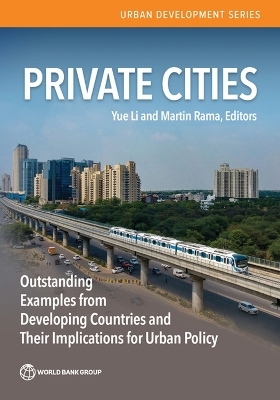
Private Cities
Outstanding Examples from Developing Countries and their Implications for Urban Policy
Seiten
2023
World Bank Publications (Verlag)
978-1-4648-1833-2 (ISBN)
World Bank Publications (Verlag)
978-1-4648-1833-2 (ISBN)
- Titel z.Zt. nicht lieferbar
- Versandkostenfrei innerhalb Deutschlands
- Auch auf Rechnung
- Verfügbarkeit in der Filiale vor Ort prüfen
- Artikel merken
Institutional weaknesses limit the capacity of local governments to support efficient urbanisation in developing countries - they also lead to the emergence of large developers, who have the ability to build entire cities. This paper analyses this urbanisation process.
Institutional weaknesses limit the capacity of local governments to support efficient urbanization in developing countries. They also lead to the emergence of large developers with the clout to build entire cities. This paper analyzes the urbanization process when local governments are weak and large developers are powerful. Results from a non-cooperative game setting with minimal assumptions show that multiple equilibria can emerge depending on key institutional parameters of the model and the nature of the game, but all of them are inefficient. In this simple setting, increasing the capacity of the local government may not lead to better outcomes, because it may crowd out urban land development by the more effective private investor. Subsidizing the large investor can ensure efficiency, but it makes the rest of society worse off. Selling the rights to the city can be Pareto efficient, but only provided that the price at which the rights are sold are sufficiently high. However, more analytical and empirical work is needed before these analyses can be deemed relevant in practice. Competition among jurisdictions, time consistency challenges, and the social implications of private cities deserve special attention.
Institutional weaknesses limit the capacity of local governments to support efficient urbanization in developing countries. They also lead to the emergence of large developers with the clout to build entire cities. This paper analyzes the urbanization process when local governments are weak and large developers are powerful. Results from a non-cooperative game setting with minimal assumptions show that multiple equilibria can emerge depending on key institutional parameters of the model and the nature of the game, but all of them are inefficient. In this simple setting, increasing the capacity of the local government may not lead to better outcomes, because it may crowd out urban land development by the more effective private investor. Subsidizing the large investor can ensure efficiency, but it makes the rest of society worse off. Selling the rights to the city can be Pareto efficient, but only provided that the price at which the rights are sold are sufficiently high. However, more analytical and empirical work is needed before these analyses can be deemed relevant in practice. Competition among jurisdictions, time consistency challenges, and the social implications of private cities deserve special attention.
| Erscheinungsdatum | 31.03.2022 |
|---|---|
| Reihe/Serie | South Asia Development Forum |
| Verlagsort | Washington |
| Sprache | englisch |
| Gewicht | 363 g |
| Themenwelt | Naturwissenschaften ► Geowissenschaften ► Geografie / Kartografie |
| Wirtschaft ► Betriebswirtschaft / Management ► Planung / Organisation | |
| Wirtschaft ► Volkswirtschaftslehre | |
| ISBN-10 | 1-4648-1833-9 / 1464818339 |
| ISBN-13 | 978-1-4648-1833-2 / 9781464818332 |
| Zustand | Neuware |
| Haben Sie eine Frage zum Produkt? |
Mehr entdecken
aus dem Bereich
aus dem Bereich
über eine faszinierende Welt zwischen Wasser und Land und warum sie …
Buch | Hardcover (2023)
dtv (Verlag)
24,00 €
Buch | Hardcover (2024)
Schweizerbart'sche, E. (Verlag)
24,00 €
Eine Einführung in die spezielle Mineralogie, Petrologie und …
Buch | Hardcover (2022)
Springer Spektrum (Verlag)
59,99 €


